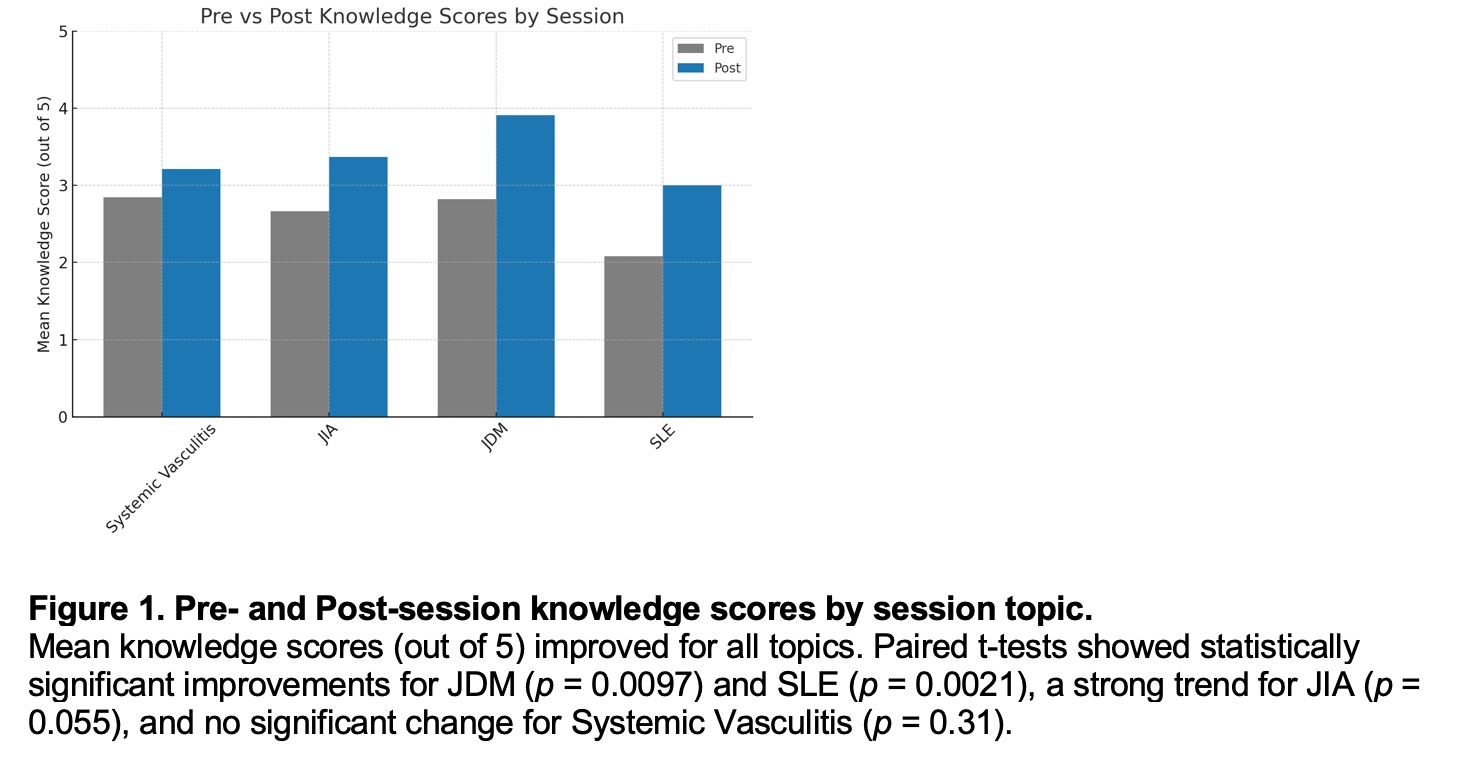Session Information
Session Type: Poster Session C
Session Time: 10:30AM-12:30PM
Background/Purpose: Pediatric rheumatic diseases are rare and frequently under-recognized by trainees, leading to delayed diagnosis and referral. To address this gap, we developed a case-based curriculum to enhance resident knowledge, confidence, and interest in pediatric rheumatology. The objective of this study was to evaluate the impact of a four-session case-based curriculum on resident knowledge, confidence in recognizing patients with rheumatic disease and initiating workup for pediatric rheumatology patients, and creating subspecialty interest in pediatric rheumatology.
Methods: Four interactive, case-based group learning sessions were delivered on systemic vasculitis, juvenile idiopathic arthritis (JIA), systemic lupus erythematosus (SLE), and juvenile dermatomyositis (JDM). Participants completed identical pre- and post-session knowledge assessments (5-item quizzes) and a post-session survey assessing retrospective pre- and post-confidence in recognizing and working up pediatric rheumatic diseases (5-point Likert scale). The survey evaluated session usefulness, prior pediatric rheumatology elective experience, and elective interest. Paired t-tests and Wilcoxon signed-rank tests were used for pre/post comparisons; ANOVA and Kruskal-Wallis tests were used for PGY-level comparisons.
Results: Forty-six evaluations were collected. Knowledge scores significantly improved for JDM (p= 0.0097) and SLE (p= 0.0021); JIA showed a positive trend ( p= 0.055), while vasculitis did not reach significance (p= 0.31). Confidence significantly improved in all sessions for both recognizing and working up rheumatic disease (p < 0.05 for all). PGY2 residents had the highest post-session knowledge scores (p= 0.034); PGY3s had the lowest baseline confidence in recognizing disease (p= 0.040), though post-session confidence was similar across PGY levels. All participants reported that the sessions were helpful for general pediatrics. While only 8–33% had previously completed a pediatric rheumatology elective, 67–78% reported increased interest in pursuing one after the session.
Conclusion: A brief, structured case-based curriculum significantly improved resident knowledge and confidence in evaluating pediatric rheumatic disease and enhanced interest in subspecialty electives. These findings support broader integration of targeted rheumatology education into pediatric residency training.
To cite this abstract in AMA style:
Balmuri N. Enhancing Pediatric Rheumatology Education Through Case-Based Learning: Impact on Knowledge, Confidence, and Elective Interest [abstract]. Arthritis Rheumatol. 2025; 77 (suppl 9). https://acrabstracts.org/abstract/enhancing-pediatric-rheumatology-education-through-case-based-learning-impact-on-knowledge-confidence-and-elective-interest/. Accessed .« Back to ACR Convergence 2025
ACR Meeting Abstracts - https://acrabstracts.org/abstract/enhancing-pediatric-rheumatology-education-through-case-based-learning-impact-on-knowledge-confidence-and-elective-interest/


.jpg)
.jpg)